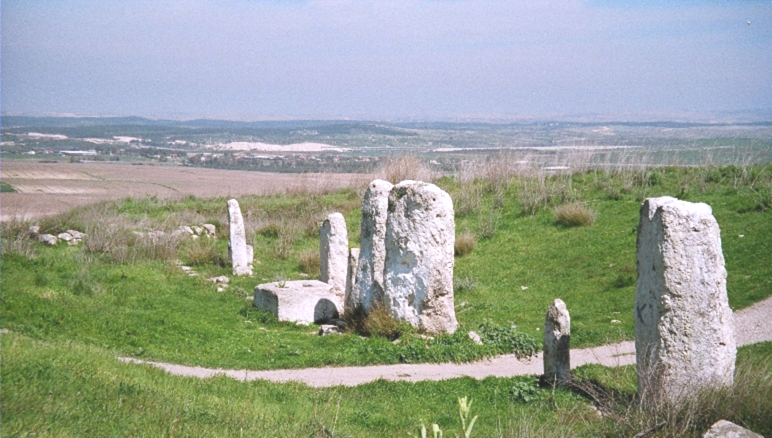2 July. Jonathan demolishes the Philistine pillar at Geba
“Saul chose 3,000 men from Israel. 2,000 men stayed with him at Michmash in the mountains of Bethel, and 1,000 men stayed with [his son] Jonathan at Gibeah in Benjamin. Saul sent the other men in the army back home.”
“Jonathan attacked the Philistine camp [literally, “demolished the Philistine pillar”] in Geba, and the other Philistines heard about it. Saul said, ‘Let the Hebrews hear what happened.’ So he told the men to blow trumpets through all the land of Israel.”
“All the Israelites heard the news. The men said, ‘Saul has defeated the Philistine camp [literally, “demolished the Philistine pillar”]. Now the Philistines will really hate us!’ Then the Israelites were called to join Saul at Gilgal.”
“The Philistines gathered to fight Israel with 3,000 chariots and 6,000 men to ride in them. Their soldiers were as many as the grains of sand on the seashore. The Philistines went and camped at Michmash, which is east of Beth Aven.”
“When the Israelites saw that they were in trouble, they went to hide in caves and in bushes, among the rocks and in pits and wells. Some Hebrews even went across the Jordan River to the land of Gad and Gilead. But Saul stayed at Gilgal, and all the men in his army were shaking with fear.”
(1 Samuel 13:2-7)

Chapter 13 of 1 Samuel is widely misquoted and misunderstood. Verse 1 is unreliable as a chronological guide to Saul’s age and the length of his reign as the figures quoted in some translations are only found in a few late copies of the Greek Septuagint version of the Old Testament, and are not stated in the original Hebrew Bible. As a result, we’ve chosen to omit the verse completely as it’s clear that Chapter 12 and Verse 1 of Chapter 13 were inserted into the Biblical text at a later time and interrupt the flow and continuity of the original text.
After his victory over the Ammonites (see 1 Samuel 11:1-15), Saul decided to capitalise on his success by expelling the Philistines from the heartland of Israel. By luring them into the hill country of Ephraim, north of Jebus (Jerusalem), where chariots were difficult and ineffective to deploy, Saul hoped for a quick victory before Philistine troop reinforcements could be sent from the five cities of the Philistine confederation on the coastal plain.
In an act of defiance intended to cause the Philistines to march into the area to punish the Israelites, Saul’s son Jonathan demolished the Philistine 'pillar' at Geba (see 10 on the map posted on 27 June). Some translations say Jonathan attacked (or defeated) the “Philistine camp” at Geba; but this is not actually what the Hebrew says. The Hebrew word ‘netsib’ means a ‘pillar’ or standing stone erected to indicate Philistine overlordship of the area. So Jonathan actually attacked the ‘pillar’ – the symbol of Philistine domination – not a Philistine ‘camp’. The demolition of the pillar marking the Philistine’s territory was guaranteed to infuriate the Philistines and lure them into the area.
Meanwhile, Saul got his messengers to blow the war trumpets throughout Israel, and summoned the men of Israel to join him at Gilgal, to where he had retreated, south of Michmash and near to Jericho (see 11 on the map).
The Philistines heard that Jonathan had demolished their pillar and saw this as a challenge to their authority. Consequently, they assembled a huge army of soldiers, with three thousand chariots, and headed for the Michmash Pass, close to Geba where the Philistine pillar had been demolished.
When the Israelites, however, learnt about the great strength of the Philistine force camped at Michmash, many of them deserted or hid in caves. This troubled Saul who, faced with more desertions, wanted to attack the Philistines as quickly as possible to maintain the momentum of his recent victory over the Ammonites.
The only problem was that Samuel had told Saul to wait until he arrived before making the sacrificial offerings to God prior to attacking the Philistines. But Samuel was nowhere to be seen!
The photo (by ×”× ×™×וליתי) shows several standing stones at Gezer, similar to the Philistine standing stone that Jonathan demolished at Geba.
You can read more about Michmash and Geba @ https://www.thebiblejourney.org/biblejourney2/30-israel-becomes-a-kingdom-under-saul-and-david/jonathan-demolishes-the-philistine-pillar-at-geba/
